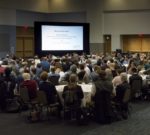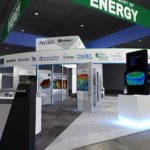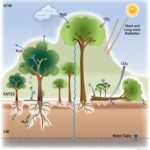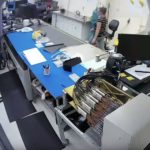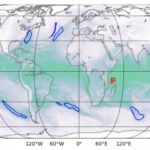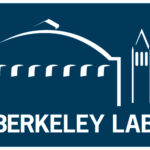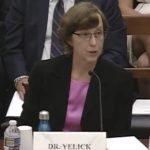Scientists and Engineers at Berkeley Lab are busy preparing for Exascale supercomputing this week at the ECP Annual Meeting in Houston. With a full agenda running five days, LBL researchers will contribute Two Plenaries, Five Tutorials, 15 Breakouts and 20 Posters. “Sponsored by the Exascale Computing Project, the ECP Annual Meeting centers around the many technical accomplishments of our talented research teams, while providing a collaborative working forum that includes featured speakers, workshops, tutorials, and numerous planning and co-design meetings in support of integrated project understanding, team building and continued progress.”
DOE to Showcase World-Class Computational Science at SC18
Researchers and staff from 15 National Labs will showcase DOE’s latest computing and networking innovations and accomplishments at SC18 in Dallas next week. “Several of the talks and demos will highlight achievements by DOE’s Exascale Computing Program (ECP), a multi-lab, seven-year collaborative effort focused on accelerating the delivery of a capable exascale computing ecosystem by 2021.”
Job of the Week: Software Developer for the FATES Project at LBNL
LBNL is seeking a Software Developer for the FATES Project in our Job of the Week. “The engineer will work with the FATES model, which is a size and age structured dynamic vegetation model that represents plant physiology and ecosystem assembly processes for use within Earth system models. This position will be principally funded by the NGEE-Tropics project, which is a long-term, DOE-supported effort to bring together observational and theoretical approaches to build, inform, and test the representation of tropical forests within Earth system models.”
Watch 5,000 Robots Merge to Map the Universe in 3-D
In this video, scientists describe how the Dark Energy Spectroscopic Instrument (DESI) will measure the effect of dark energy on the expansion of the universe. It will obtain optical spectra for tens of millions of galaxies and quasars, constructing a 3D map spanning the nearby universe to 11 billion light years. “How do you create the largest 3D map of the universe? It’s as easy as teaching 5,000 robots how to “dance.” DESI, the Dark Energy Spectroscopic Instrument, is an experiment that will target millions of distant galaxies by automatically swiveling fiber-optic positioners (the robots) to point at them and gather their light.”
Summit Supercomputer Breaks Exaop Barrier on Neural Net Trained to Recognize Extreme Weather Patterns
“Using a climate dataset from Berkeley Lab on the Summit supercomputer at Oak Ridge, they trained a deep neural network to identify extreme weather patterns from high-resolution climate simulations. By tapping into the specialized NVIDIA Tensor Cores built into the GPUs at scale, the researchers achieved a peak performance of 1.13 exaops and a sustained performance of 0.999 – the fastest deep learning algorithm reported to date and an achievement that earned them a spot on this year’s list of finalists for the Gordon Bell Prize.”
Job of the Week: Computer Science Postdoctoral Scholar at LBNL
LBNL is seeking a Computer Science Postdoctoral Scholar in our Job of the Week. “Berkeley Lab’s Computational Research Division has an opening for a Computer Science Postdoctoral Scholar. Develop performance modeling and analytical capabilities and tools for manycore and GPU-accelerated supercomputers and apply them to distributed memory Office of Science applications running on such platforms.”
Job of the Week: Computer Science Postdoctoral Scholar at Berkeley Lab
Berkeley Lab is seeking a Computer Science Postdoctoral Scholar in our Job of the Week. “Berkeley Lab’s Computational Research Division has an opening for a Computer Science Postdoctoral Scholar. Develop performance modeling and analytical capabilities and tools for manycore and GPU-accelerated supercomputers and apply them to distributed memory Office of Science applications running on such platforms.”
Job of the Week: HPC Architecture and Performance Engineer at LBNL
Lawrence Berkeley National Lab is seeking an HPC Architecture and Performance Engineer in our Job of the Week. “Berkeley Lab’s National Energy Research Scientific Computing Center (NERSC) has an opening for a Computer Systems Engineer 3. The incumbent will contribute to an on-going Advanced Technology Group (ATG) group effort to develop a complete understanding of the issues that lead to improved application and computer system performance on extreme-scale advanced architectures. As a team member, they will contribute to efforts for NERSC in evaluating existing and emerging High Performance Computing (HPC) systems by analyzing the performance characteristics of leading-edge DOE Office of Science application codes.”
Video: Kathy Yelick from LBNL Testifies at House Hearing on Big Data Challenges and Advanced Computing
In this video, Kathy Yelick from LBNL describes why the US needs to accelerate its efforts to stay ahead in AI and Big Data Analytics. “Data-driven scientific discovery is poised to deliver breakthroughs across many disciplines, and the U.S. Department of Energy, through its national laboratories, is well positioned to play a leadership role in this revolution. Driven by DOE innovations in instrumentation and computing, however, the scientific data sets being created are becoming increasingly challenging to sift through and manage.”
How Exascale will Move Earthquake Simulation Forward
In this video from the HPC User Forum in Tucson, David McCallen from LBNL describes how exascale computing capabilities will enhance earthquake simulation for improved structural safety. “With the major advances occurring in high performance computing, the ability to accurately simulate the complex processes associated with major earthquakes is becoming a reality. High performance simulations offer a transformational approach to earthquake hazard and risk assessments that can dramatically increase our understanding of earthquake processes and provide improved estimates of the ground motions that can be expected in future earthquakes.”

